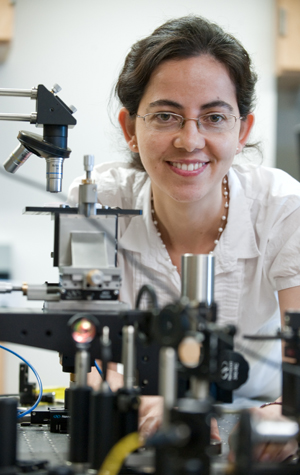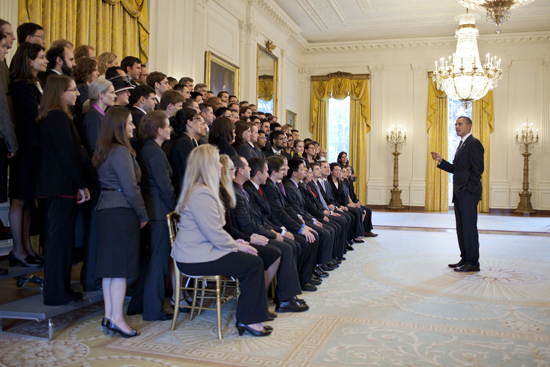Meet One of Popular Science’s “Brilliant 10”
ENG's Hatice Altug also receives White House honor

Hatice Altug was among a select group of scientists and engineers honored by President Obama earlier this month at the White House.
The College of Engineering assistant professor of electrical and computer engineering and of materials science and engineering and 93 others received this year’s Presidential Early Career Award for Scientists and Engineers (PECASE), the U.S. government’s highest honor for science and engineering professionals in the early stages of their independent research careers. As well as attending the White House ceremony, awardees receive a research grant lasting up to five years.
Altug led the development of a biosensor that uses tiny crystals to manipulate light to detect a virus, a protein, or a cancer cell in a drop of blood. She is part of a team of BU researchers awarded $4.8 million by the National Institutes of Health to advance the technology.
She was also recently named one of Popular Science’s “Brilliant 10,” a group of researchers under 40 who made transformational contributions to their fields during 2010.
Altug’s biosensor can quickly identify dangerous viruses such as Ebola and Marburg in resource-limited settings, which has profound implications for containing pandemics, as well as for assessing terrorist threats in places like airports. The device is expected to have an immediate impact in Africa, where there are limited laboratory resources and a wide range of viral infections.
The sensor uses breakthrough nanotechnology developed by Altug to create an array of apertures 200 to 350 nanometers in diameter that transmit light more strongly at certain wavelengths. When a live virus binds to the sensor surface, it shifts the resonance frequency of the light transmitted through the nanoholes. The magnitude of that shift reveals the concentration of the virus. She has also invented a new fabrication technique that can enable mass production of these biosensors at extremely low cost.

Along with principal investigator John Connor, a School of Medicine assistant professor of microbiology, and Selim Ünlü, an ENG professor of electrical and computer engineering and of biomedical engineering, Altug will use the NIH grant to refine virus detection platforms they have developed independently. Catherine Klapperich, an ENG associate professor of biomedical engineering and of mechanical engineering, and Mario Cabodi, an ENG research assistant professor of biomedical engineering, will further advance microfluidics technology they’ve designed to integrate sample preparation in each of the two platforms. The BU researchers will partner with Becton Dickinson, a leading global medical technology company, to transform one of the virus diagnostic platforms into a working prototype, and enlist Thomas Geisbert, a University of Texas Medical Branch professor and an internationally recognized expert on viral hemorrhagic fever diseases, to test it in his lab in Texas.
Altug says it is a great honor to be selected one of the Popular Science “Brilliant 10.” “I am very excited that the work that we do in my lab with my students has been recognized with such a prestigious award,” she says. “I’m looking forward to the time when our approaches based on nanotechnologies will impact and improve human life greatly.”
Popular Science editor-in-chief Mark Jannot says the magazine’s “Brilliant 10” is “a testament to the importance of scientific research and a salute to the dazzling young minds driving it. Each year we solicit nominations from hundreds of eminent scientists and whittle the candidates down to the ones whose work really blows the tops of our heads off. Over the past 10 years, we’ve celebrated the achievements of 100 scientists who are changing the way we look at, and live in, our world, and I can’t wait to see what the next decade brings.”
Comments & Discussion
Boston University moderates comments to facilitate an informed, substantive, civil conversation. Abusive, profane, self-promotional, misleading, incoherent or off-topic comments will be rejected. Moderators are staffed during regular business hours (EST) and can only accept comments written in English. Statistics or facts must include a citation or a link to the citation.